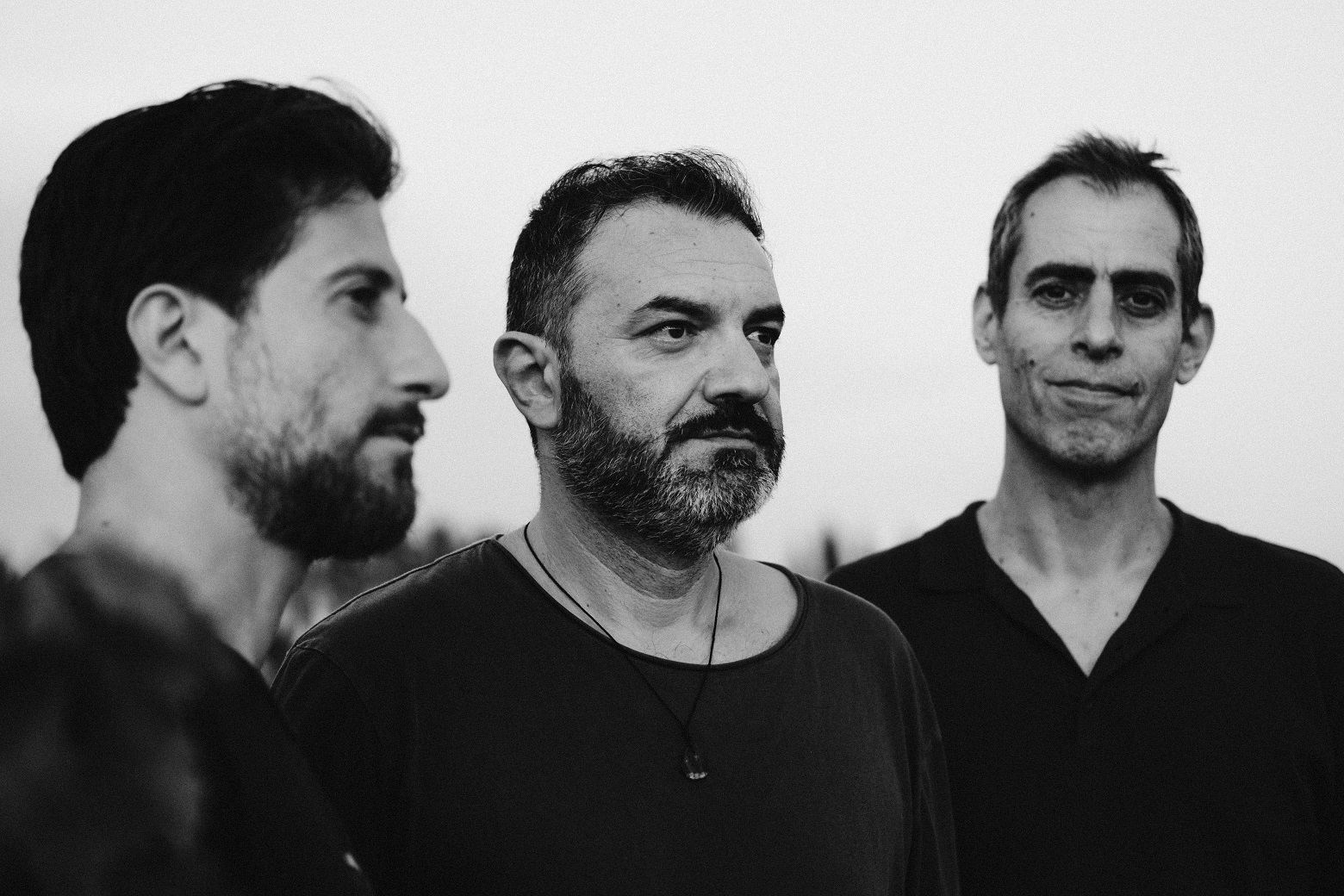

Entrance: 25.00€
Young under 30: 13€ (discount rules)
Price: 5.00€
Redi Hasa (ALB): cello
Bijan Chemirani (IRN): oud, percussion (zarb, daf, calabash, saz lafta)
Rami Khalife (LBN): piano
Can beauty save the world? This is the wager of Bijan Chemirani, Redi Hasa, and Rami Khalifé—three extraordinary virtuosos united to create "L’Antidote", an instrumental repertoire of incredible and rare beauty and refinement, setting the vital, healing breath of music against the poisons that the present feeds us daily. An Iranian master of the zarb and Persian percussion, equally passionate about jazz and Mediterranean sounds, Bijan Chemirani blends his science of rhythm with that of Albanian cellist Redi Hasa—known for having helped revive the traditional music of southern Italy, as well as for collaborations with Maria Mazzotta, Ludovico Einaudi, and Robert Plant—and with Lebanese pianist Rami Khalifé, who masterfully weaves classical and electronic elements on his piano keys. Although their paths had crossed before, the real meeting took place in early March 2020 in a recording studio in Lari, Tuscany, during a session abruptly cut short by the arrival of the pandemic, when time itself seemed on the verge of stopping. The three virtuosos reunited in autumn 2024, in Puglia, in a magnificent, sun-drenched setting, to finally record "L’Antidote", scheduled for release in September 2025. “Music is an antidote to reality, which is sometimes marked by disappointments and broken dreams,” explains Rami Khalifé. “It has a therapeutic effect on the mind and body: it calms us, gives us hope, heals us, and helps us see things in a new light. Music transcends everything.” In their athanor (alchemical crucible), the three alchemists first pour their extraordinary gift for improvisation into the composition of the album, created without sheet music. Far from any ego trips, in "L’Antidote" Bijan, Redi, and Rami listen to one another and weave poetic, sensitive landscapes where their personal idioms meet glimpses of a plural Orient, balancing intimate geographies with a shared taste for experimentation. “L’Antidote is an island where we can meet to play music that reflects who we are and unites us, beyond our individualities,” summarizes Bijan Chemirani, who plays zarb, daf, calabash, and saz lafta with the humility of a sage, while Rami Khalifé unfolds his art of contrast on a grand piano, sometimes prepared. As for Redi Hasa, he makes his cello sing—sometimes minimalist, sometimes baroque, sometimes tormented. Experimentation and tradition merge thanks to a skilled use of electronics, distortions, and various effects applied to acoustic instruments. “For me, music is a breath, an air, an encounter. With Rami and Bijan we found each other, and through the language of music we came to know each other and tell our stories. Beautiful nuances were born, rooted in Bijan’s, Rami’s, and my own lands—Albania,” says Redi. Space, air, time, silence… Immersed in the beauty of an environment conducive to dreaming and contemplation, the trio lets itself be permeated by the essence of meditative music, in chiaroscuro pieces with delicate Levantine or hypnotic melodies. But if purity and contemplation help find peace, sometimes nothing works better than a good trance to purge negative energy: to sweat out the poison, one must dance! The three musicians then indulge in the joy of fast rhythms, where the fever of electronics flirts with Balkan jubilation. Dance, enjoy, cry, (dis)hope, laugh, heal… a spectrum of emotions runs through "L’Antidote", connecting human beings and cultures. With "L’Antidote", the three musicians cultivate beauty and hope on a universal scale.
Production note:
“We began working on the project between late February and early March 2020. The musicians had arrived from different places to reach Lari, a beautiful village in Tuscany. The first scents of the imminent spring were already clouded by what was about to happen. I had caught the first signs in Singapore, in the city and especially on the return flight, where many passengers were wearing masks. But, like many others, I underestimated them. I was excited about what could emerge from that artistic encounter: the thought of failure never even crossed my mind. I had three extraordinary musicians who, despite not knowing each other, had much in common: coming from families of artists, a musical education, family mentors, and the particularity of having had to leave their homelands for obvious reasons. Iran, Lebanon, and Albania were not—and are not—easy places to express one’s art. I had a great traveling companion, Alberto Fabris, an excellent producer and bearer of good vibes, with an innate ability to create cohesion. Yes, of course, the unpredictable is always around the corner—the ego of every human being—but deep down I knew the result would be excellent. The pandemic warnings grew increasingly alarming. Italy had become the epicenter of the virus’s spread. In Lari, we kept playing, not without some concern, and I joked that we were working on the antidote! On March 7, 2020, everything stopped, and everyone went home. We were left with the recordings from those sessions, which became the project’s first laboratory… everyone at home, in lockdown—some in Australia, some in Greece, some in Italy—waiting for it to pass. An unpredictable, unexpected event. Two years later, with the gradual return to normality, each of us resumed projects that had been on hold for far too long. We decided to wait before organizing another session. That session finally took place in September 2024. This time we met in Puglia, surrounded by the scents of summer fading into autumn, and by the desire to meet again and get back to work. Everyone was eager and ready to reconnect. The pandemic was over, but the sense of emergency lingered. Too many devastating events: wars, climate change, human selfishness, and the feeling that the worst was yet to come. The emergency was not truly over; we were still searching for an antidote. And for us, music is exactly that: our antidote.”
Bijan Chemirani – Iranian percussionist and oud player, learned the zarb from his father Djamchid Chemirani and his brother Keyvan. His career began at a young age, performing in concerts and recording with renowned artists such as Ross Daly, Dariush Talai, Ballaké Sissoko, Jean-Guihen Queyras, Sylvain Luc, Sting, Socrates Sinopoulos, Serge Teyssot-Gay, Renaud Garcia Fons, and many others. At 22, between Athens and Marseille, he recorded his first album with Ross Daly: "Gulistan, Jardin des Roses".
Rami Khalifé – Lebanese, born in the midst of the civil war in Beirut. Famous for his reinterpretations of classical music, he has performed as a soloist with some of the world’s most prestigious orchestras, including the Globalis Orchestra, the Qatar Philharmonic Orchestra, and the Liverpool Philharmonic Orchestra. With a style as eclectic as it is bold, he has established himself as one of the most influential composers of the 21st century. He has also composed soundtracks for films and documentaries. The Daily Star described him as “a musician of the highest caliber and pure expression... a welcome and experimental deviation from the norm in the conformism of contemporary classical composition.”
Redi Hasa – Albanian cellist and composer, born into a family of artists, began studying the cello at age seven. His first solo album, "The Stolen Cello", is an intimate confrontation with the instrument, from which was born a deep bond that permeates every track. His second album, "My Nirvana", explores an introspective journey into the ‘grunge heart’ of his musical approach, in homage to the band that deeply influenced him. Throughout his career he has collaborated with Kočani Orkestar, Boban Marković, Bobby McFerrin, Paolo Fresu, and since 2012 has been a permanent member of Ludovico Einaudi’s band.